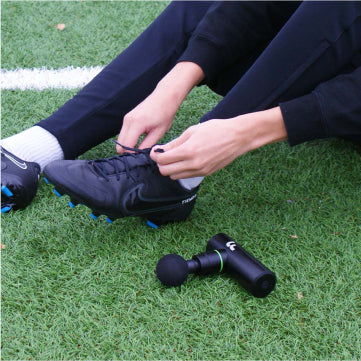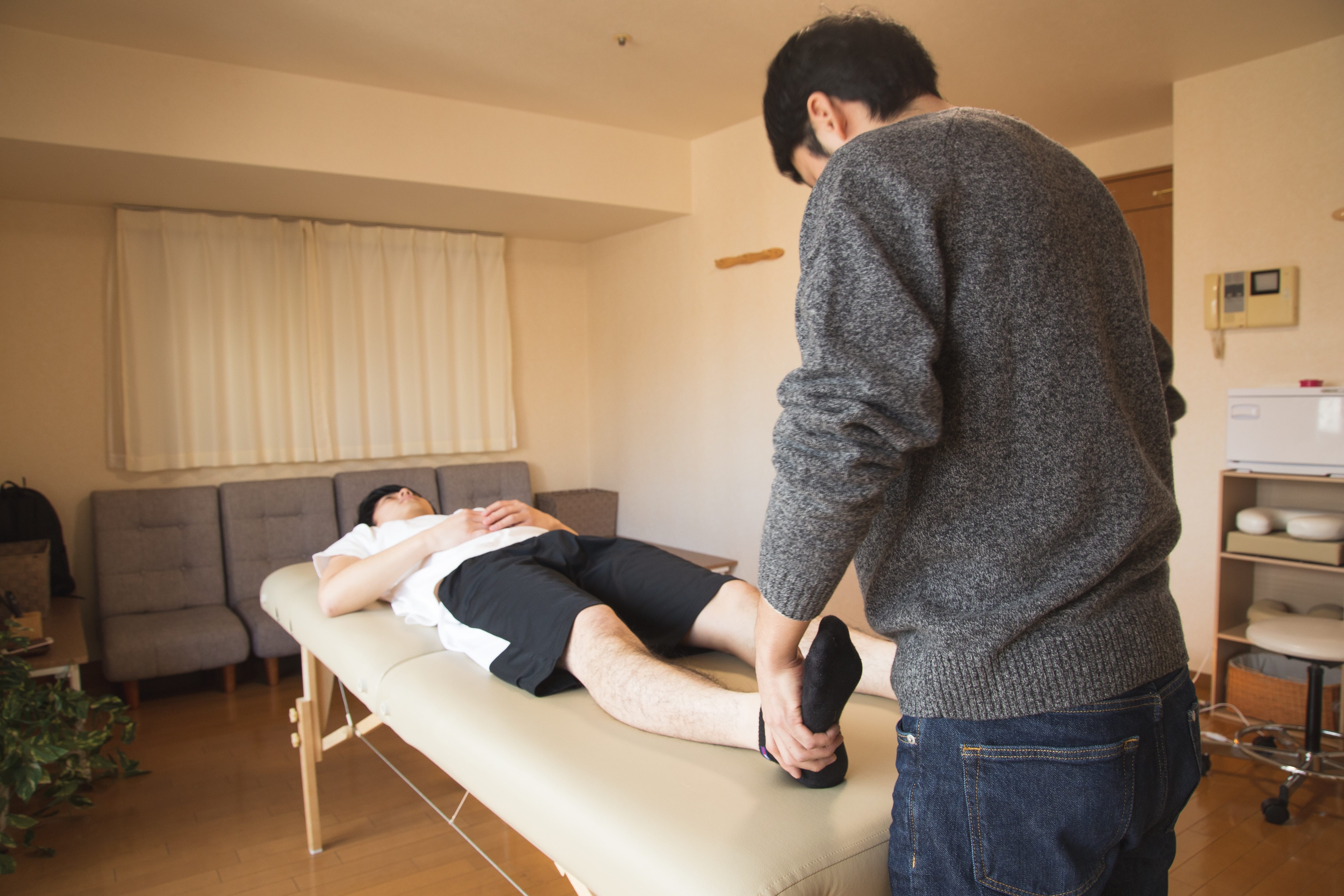Have you ever experienced tingling in your legs and wondered what it was?
Something around a painful sensation that feels like walking on pins and needles with every step you take.
If so, you are not alone.
Many people experience tingling sensations in their legs at some point during their lives, making it one of the most common complaints doctors see.
This common sensory disturbance can be caused by various conditions ranging from simple muscle cramps to more severe disorders such as Diabetes or Peripheral Neuropathy.
In this article, we will walk you through everything you need to know about this medical condition and what you can do to feel better.
Let's get to it!
Symptoms of Tingling Legs
Remember when we mentioned that tingling in the legs can give a pins-and-needles sensation with every step you take?
Well, that's just a symptom of exactly how it feels. Here are other additional symptoms you should watch out for.
1. Burning sensation
A common symptom that comes with tingling in the leg is burning pain. This common type of pain usually occurs in the feet and toes and may spread into the calf area.
2. Feeling of numbness
Foot numbness is yet another sign of tingling legs.
This feeling can start in the feet and move upwards towards the knees or thighs. It is pretty similar to having an electric shock going through your body.
3. Weakness
When you experience abnormal sensations in your legs, you might also notice weakness.
You may notice having trouble standing up straight or moving your limbs. You may even feel weak enough to fall over if you don't pay attention.
4. Feeling of heaviness
Feeling heavy is another symptom of tingling legs.
It is very similar to being tired but much stronger than normal fatigue. If you feel heavy all day long, then you probably suffer from this problem.
Now that you are familiar with the symptoms of tingling legs, let's take a look at what causes it.
Common Causes of Tingling Legs
Feeling uncomfortable sensations in your legs can result from many different reasons.
When treating these symptoms, it is important to pinpoint the cause of the problem. The following list includes just a few of the most common causes of leg tingling:
1. Peripheral Neuropathy
Peripheral Neuropathy is a condition where peripheral nerves in your body become damaged, causing them to malfunction.
When this happens, damaged sciatic nerves may send incorrect signals to the brain, resulting in tingling sensations. Peripheral Neuropathy is commonly seen in patients who have had Diabetes for a long time and has been linked to other diseases like lupus and multiple sclerosis.
2. Diabetes
Another major cause of tingling sensation in the legs is Diabetes.
This medical condition occurs when there is an overproduction of glucose (sugar) in the bloodstream. When blood sugar levels get out of balance, nerve cells can begin to die off. This can lead to several complications, including tingling in the legs.
What's more, people with Diabetes are also at risk for developing diabetic foot ulcers. These sores occur because the skin becomes too dry and brittle due to high blood glucose levels.
3. Muscle cramps
Muscle cramps are another common reason why you might feel tingling in your legs.
These extremely painful episodes usually occur when muscles contract too much and then relax too quickly. They can also happen if you exercise excessively without adequate rest periods.
Muscle cramps can last anywhere between 30 seconds to several minutes. Other triggers include dehydration, lack of sleep, stress, and caffeine intake.
4. Multiple sclerosis
MS is caused by an autoimmune response from the body's immune cells against myelin, which protects nerve fibers.
As a result, the nerves inside the brain and spinal cord stop sending messages to each other, resulting in tingling sensations in the legs. Multiple sclerosis is mostly diagnosed in adults but can affect children as well.
5. Medication side effects
Taking certain medications can also trigger tingling in your legs.
Prescription drugs like anti-depressants, anti-seizure drugs, chronic pain killers, and chemotherapy drugs are known to affect how our bodies function. Some anti-inflammatory medications can even have a loss of appetite side effect.
If you are fond of prescription medications, it is best to learn about their possible side effects before use. Current medications should be discussed with your doctor so that they can be adjusted or changed if necessary.
Now let's look at some available treatments for leg tingling.
Preventions to Treat Tingling Legs
When it comes to getting rid of tingling sensations in your legs, receiving the right treatment options is essential to feeling better.
Here are just some tips to help you feel better:
1. Exercise regularly
Regular exercise is one of the best ways to prevent uncomfortable sensations in your legs and improve overall health.
If you notice that you are experiencing tingling in your lower limbs, try walking around the block or doing simple stretches. You can also do squats, lunges, leg lifts, and calf raises.
These movements will strengthen your leg muscles and improve the function of your blood vessels to increase blood flow. Just ensure that you don't overexert yourself while exercising to prevent any pressure on your legs.
2. Get enough sleep
Getting enough sleep is another way to treat tingling sensations in the leg.
If you are not getting enough sleep, you could be more prone to muscle cramping. What's more, sleep deprivation can also contribute to fatigue which may further aggravate the problem.
Try going to bed earlier and waking up at least two hours earlier. Also, avoid staying awake late into the night.
3. Eat healthy foods
Eating a balanced diet is important for maintaining good health and improving blood flow to your legs.
If you experience tingling sensations in your legs, try eating foods rich in vitamin B6, magnesium, iron, zinc, and calcium.
Vitamin B6 helps to maintain normal nervous system functioning, while magnesium supports proper nerve conduction. Iron is needed for energy production, while zinc promotes cell growth. Calcium strengthens bones and teeth.
You may want to consider adding fiber-rich foods to your daily meals. Fiber helps keep your digestive system working properly and regulate bowel movement.
4. Avoid alcohol
Alcohol consumption intake has been linked to an increased risk of developing tingling in the legs.
Excessive alcohol intake can lead to dehydration and cause your body to lose water weight. This can result in swelling in your legs and muscle weakness.
What's more, excessive alcohol consumption can also make you feel tired and sluggish. That's why it's best to limit yourself to no more than 2 drinks per day.
If you have a history of alcoholism, seek medical advice immediately to reduce alcohol reduction.
5. Air compression massage therapy
Because often the cause of restless legs is not known, and therefore it is obvious that circulation is poor, a lot of people benefit from a fairly new massage treatment, namely: air compression massage.
Compression therapy is a massage treatment that works on air pressure. The air cushions in the cuff, are alternately filled with air in a certain rhythm and then deflated again. This provides an intensive massage of the legs and feet.
This natural treatment is traditionally used in the medical world to improve circulation, strengthen veins and accelerate wound healing. Fusion has made this method accessible to everyone with the Fusion Air-C Pro.
When using this device, blood flow is improved in an effective and fast way, eliminating muscle knots and increasing blood flow opportunity. The device was designed in response to demand from top athletes and the medical world and has provided thousands of people with fitter and pain-free legs.

6. Seek professional help
If none of these tips work for you, consider going for physical therapy or chiropractic care. These treatments can help improve blood supply and restore balance to your body.
If you are experiencing any other chronic symptoms, such as uncomfortable numbness or leg pain, consult your medical provider immediately.
Medical professionals will recommend proper treatment plans depending on the underlying causes of your condition and medical history.
If you have Diabetes, your medical provider might suggest taking insulin injections. In addition, he/she may prescribe anti-inflammatory drugs such as ibuprofen or naproxen sodium.
Whatever the case, it is important to follow your doctor's instructions and take all medications as prescribed. Checkout some questions we get asked about tingling in the legs.
Frequently Asked Questions
Here are a few questions about tingling legs that people ask us frequently.
We hope this information will answer any questions you may have on your journey to getting better.
How long does it take for symptoms of tingling legs to go away?
Tingling leg symptoms can disappear within days, but they could last longer.
Some people feel relief within days, while others need weeks or months to recover. It all depends on how severe the underlying condition is.
Can I treat tingling legs at home?
Yes!
Home treatment is very helpful for minor issues such as soreness or muscle cramps.
However, if you experience leg numbness, weakness, or any loss of sensation, you should consult your medical provider for a physical examination and accurate diagnosis.
Is it normal to feel tingling sensations in my leg?
No, not always.
Tingling in the legs is usually caused by an underlying health issue.
That's why it is important to find out the exact cause of the problem before trying home remedies. You should consult your physician if you don't know what is wrong.
When should I be worried about tingling in my legs?
You should feel worried about tingling sensations when they become more frequent or intense. This could indicate a serious problem. In addition, you should be concerned if you experience new symptoms after being symptom-free for some time.
How often should I consult a healthcare provider for my tingling leg?
Paying your health care provider a visit every two to three months is generally enough. Your healthcare provider can check your overall health and ensure everything is okay. They can also order additional tests to rule out other possible causes of tingling.
What happens if I ignore tingling in my legs? Will it get worse?
Ignoring severe symptoms of tingling legs can lead to some complications.
For example, if you do nothing, you risk developing a common disorder called Neuropathy. Neuropathy can affect your feet, hands, and face. It can also affect your blood vessels and cause nerve damage so that they no longer function properly, causing permanent disability.
Conclusion
Tingling in the legs is a relatively common problem among people that can be triggered by many conditions.
The good news is that most cases are mild and easy to treat. You can use home remedies to relieve pain and discomfort associated with tingling legs. All you have to do is choose any treatment suggestion in this article that works best for you.
However, suppose you experience chronic symptoms like chronic numbness and nerve pain. In that case, you should immediately consult your healthcare provider for a physical examination.
We hope our article has provided useful information on what you can do to prevent and manage uncomfortable sensations in your legs.





